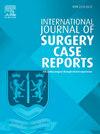Necrotizing fasciitis in a pediatric patient: Successful management in the inguinal area - A case report
IF 0.6
Q4 SURGERY
引用次数: 0
Abstract
Introduction
Necrotizing fasciitis (NF) is a rare life-threatening medical and surgical emergency. We present a case of a pediatric patient diagnosed with necrotizing fasciitis in the inguinal area which required debridement and post-operative management of the residual wound using a combination of wound closure techniques.
Case presentation
A 10-months-old girl with a history of Food-protein induced enterocolitis syndrome (FPIES) presented with septic shock and ulcerative lesions of the inguinal area. She was admitted to the Intensive Care Unit (ICU) of our hospital, antibiotic treatment was administered and a diverting colostomy was performed. Serial surgical debridement of the affected tissues resulted in an extensive tissue deficit. Management of the residual skin and soft tissues deficit included application of Negative Pressure Wound Therapy (NPWT) with Vacuum-Assisted Closure (VAC) and was followed by Oasis® extracellular matrix (ECM) graft placement. After 65 days of hospitalization, the wound surface was completely epithelialized.
Discussion
A challenging aspect of NF management is the closure of the residual skin and soft tissue deficit after surgical debridement. Considering the patient's characteristics, a less invasive reconstructive technique was sought. Application of NPWT followed by ECM graft placement are two effective options that can be combined in different stages of wound healing.
Conclusions
The management of the residual wound after surgical debridement of the affected tissue in NF requires a patient – specific approach and constant reevaluation of the management plan. NPWT and ECM graft placement can significantly contribute to wound closure and epithelization of the residual deficit in children.
一名儿童患者的坏死性筋膜炎:腹股沟区的成功治疗--病例报告
导言:坏死性筋膜炎(NF)是一种罕见的危及生命的内外科急症。我们介绍了一例被诊断为腹股沟部位坏死性筋膜炎的儿科患者,该患者需要进行清创,并在术后使用多种伤口闭合技术处理残留伤口。病例介绍 一名 10 个月大的女孩,曾患食物蛋白诱发的小肠结肠炎综合征(FPIES),出现脓毒性休克和腹股沟部位溃疡性病变。她被送入本院重症监护室(ICU),接受了抗生素治疗,并进行了结肠造口术。对受影响的组织进行了连续的手术清创,造成了广泛的组织缺损。处理残余皮肤和软组织缺损的方法包括应用负压伤口疗法(NPWT)和真空辅助闭合术(VAC),随后进行 Oasis® 细胞外基质(ECM)移植。住院 65 天后,伤口表面完全上皮化。讨论 NF 管理的一个挑战是手术清创后残余皮肤和软组织缺损的闭合。考虑到患者的特点,我们寻求了一种创伤较小的重建技术。应用 NPWT 和 ECM 移植是两种有效的方法,可在伤口愈合的不同阶段结合使用。结论 NF 受影响组织手术清创后残留伤口的处理需要针对患者的具体情况,并不断重新评估处理方案。NPWT 和 ECM 移植置入可显著促进儿童伤口闭合和残余缺损上皮化。
本文章由计算机程序翻译,如有差异,请以英文原文为准。
求助全文
约1分钟内获得全文
求助全文
来源期刊
CiteScore
1.10
自引率
0.00%
发文量
1116
审稿时长
46 days

 求助内容:
求助内容: 应助结果提醒方式:
应助结果提醒方式:


